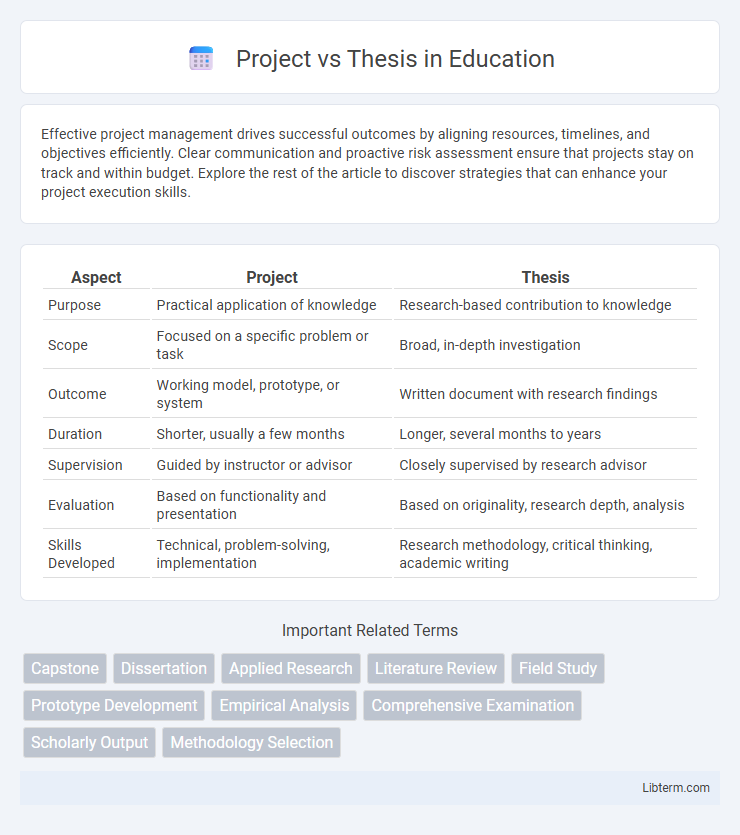Effective project management drives successful outcomes by aligning resources, timelines, and objectives efficiently. Clear communication and proactive risk assessment ensure that projects stay on track and within budget. Explore the rest of the article to discover strategies that can enhance your project execution skills.
Table of Comparison
| Aspect | Project | Thesis |
|---|---|---|
| Purpose | Practical application of knowledge | Research-based contribution to knowledge |
| Scope | Focused on a specific problem or task | Broad, in-depth investigation |
| Outcome | Working model, prototype, or system | Written document with research findings |
| Duration | Shorter, usually a few months | Longer, several months to years |
| Supervision | Guided by instructor or advisor | Closely supervised by research advisor |
| Evaluation | Based on functionality and presentation | Based on originality, research depth, analysis |
| Skills Developed | Technical, problem-solving, implementation | Research methodology, critical thinking, academic writing |
Understanding the Concepts: Project vs Thesis
A project involves practical application and problem-solving within a specific field, emphasizing hands-on experience and tangible outcomes. A thesis requires in-depth research, critical analysis, and contribution to academic knowledge, often focusing on theoretical frameworks and hypotheses. Understanding these distinctions helps students choose between developing technical skills through a project or advancing scholarly expertise through a thesis.
Key Objectives of Projects and Theses
Projects primarily aim to demonstrate practical application of theoretical knowledge by solving real-world problems or creating functional products, emphasizing hands-on experience and innovation. Theses focus on rigorous academic research, involving hypothesis formulation, comprehensive literature review, data analysis, and contributing new insights or theories to a specific field. Both serve as essential academic milestones but differ in objectives: projects prioritize applied skills and tangible outcomes, while theses emphasize scholarly investigation and theoretical advancement.
Structural Differences Between a Project and a Thesis
A project typically involves practical application and hands-on tasks focused on problem-solving within a specific domain, whereas a thesis demands extensive theoretical research and contribution to academic knowledge. Structurally, a thesis includes chapters such as literature review, methodology, results, and discussion that adhere to rigorous academic standards, while a project may emphasize implementation, design, and outcome documentation with flexible formatting. The thesis requires a detailed analysis supported by comprehensive data collection and critical evaluation, contrasting with the project's focus on demonstrating technical skills and real-world applicability.
Scope and Depth: Project vs Thesis
A project typically has a narrower scope, concentrating on practical implementation or solving a specific problem within a defined timeframe, while a thesis involves extensive research, aiming to contribute new theoretical insights or knowledge to a field. The depth of a thesis is usually greater, requiring rigorous analysis, comprehensive literature review, and original methodologies, whereas a project emphasizes application and functionality. Thesis work demands critical thinking and in-depth exploration of academic concepts, whereas projects prioritize deliverables and real-world outcomes.
Research Methodology: Project Versus Thesis Approaches
Project methodology emphasizes practical application, focusing on designing, developing, and implementing solutions using empirical techniques and real-world data. Thesis methodology prioritizes rigorous theoretical research, hypothesis formulation, and systematic data collection aimed at contributing original knowledge to the academic field. Projects often employ iterative development and testing phases, whereas theses require comprehensive literature reviews, analytical frameworks, and detailed experimental validation.
Skill Sets Developed in Projects and Theses
Projects develop practical skills such as problem-solving, time management, and hands-on technical abilities through real-world applications and teamwork. Theses enhance research skills, critical thinking, and academic writing proficiency by requiring extensive literature review, hypothesis formulation, and data analysis. Both formats cultivate domain expertise but differ in the balance between practical execution and theoretical investigation.
Evaluation Criteria: How Projects and Theses are Assessed
Projects are typically assessed based on practical implementation, functionality, innovation, and application of skills, emphasizing real-world problem-solving and deliverables. Theses are evaluated on originality, depth of research, theoretical framework, critical analysis, and contribution to academic knowledge within a discipline. Both require clarity in documentation and adherence to scholarly standards, but projects prioritize tangible outcomes while theses focus on intellectual rigor.
Time Commitment and Workflow Differences
A project typically requires less time commitment than a thesis, often spanning a few weeks to months, whereas a thesis demands extensive research and analysis over several months to a year or more. Workflow for a project involves practical application and iterative development with a focus on deliverables, while a thesis centers on systematic investigation, hypothesis testing, and comprehensive documentation. The thesis workflow necessitates thorough literature review, data collection, and scholarly writing, contrasting with the project's emphasis on design, implementation, and presentation.
Career and Academic Outcomes: Project vs Thesis
A project emphasizes practical skills and real-world problem solving, preparing students for immediate industry roles and hands-on career opportunities, while a thesis focuses on in-depth research and theoretical analysis, ideal for academic pursuits and advanced studies. Career outcomes from projects often include roles in technical implementation, project management, and applied research, whereas thesis work can lead to careers in academia, research institutions, and doctoral programs. Academic outcomes from a project may be limited to course completion and applied knowledge demonstration, but a thesis typically results in a published work contributing to the academic field and establishing expertise.
Choosing Between a Project and a Thesis: Decision Factors
Choosing between a project and a thesis depends on factors such as career goals, research interest, and time availability. Projects often suit those seeking practical experience and skill application, while theses are ideal for students aiming for academic research and publication. Evaluating the required depth of study, faculty guidance, and future opportunities helps determine the best path for each individual.
Project Infographic

 libterm.com
libterm.com